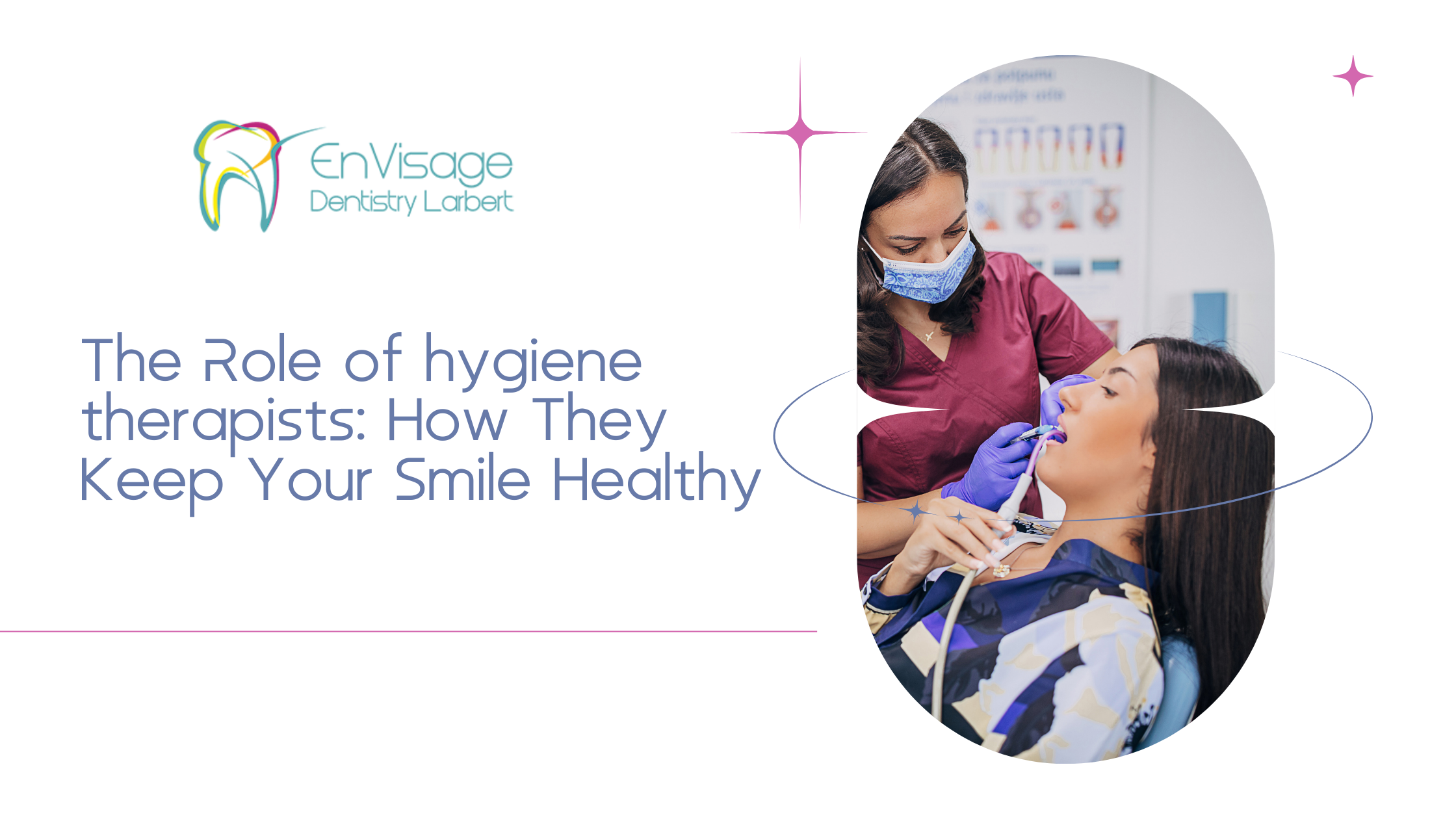
When you think about visiting the dentist, you might picture a check-up, a filling, or maybe even cosmetic treatment. But there’s another key professional who plays a vital role in keeping your mouth healthy the dental hygiene therapist.
At Envisage Dentistry Larbert, we’re proud to have Shilpa, our dedicated hygiene therapist, as part of our team. She works closely with our dentists to protect your oral health, improve your smile, and provide both preventive and routine treatments.
In this blog, we’ll explore what a dental hygiene therapist does, why their role matters, and how visiting regularly can make a big difference to your oral health.
What Is a Dental Hygiene Therapist?
A dental hygiene therapist is a highly trained oral health professional who combines the preventive focus of a hygienist with a broader scope of treatments.
While dentists focus on diagnosis and complex treatments, and hygienists concentrate on preventive care, dental therapists bridge the gap by being able to:
- Carry out professional cleaning (scaling and polishing)
- Provide tailored oral hygiene advice
- Perform restorations (fillings) on both adults and children
- Carry out deciduous (baby tooth) extractions when required
- Deliver preventive treatments, such as fluoride applications or fissure sealants
This means hygiene therapists not only help you prevent problems like gum disease and decay but also provide everyday treatments to keep your smile healthier for longer.
What Happens During a Hygiene Therapist Appointment?
A visit to see our hygiene therapist at Larbert is thorough, comfortable, and focused on your individual needs. Here’s what you can usually expect:
1. Assessment of Your Oral Health
The hygiene therapist will examine your teeth and gums, checking for signs of gum disease, plaque build-up, decay, other concern or changes since your last visit.
2. Professional Cleaning (Scaling and Polishing)
Using specialised instruments, our Hygiene Therapist would carry out a deep clean, removing plaque and tartar that brushing and flossing can’t reach. Polishing leaves your teeth smoother and fresher.
3. Tailored Oral Hygiene Advice
Every patient’s mouth is different. Your dental therapist will give personalised advice on the best way to look after your teeth and gums at home, which might include:
- Brushing techniques specific to your needs.
- Guidance on whether a manual or electric toothbrush is best.
- Recommendations for floss or interdental brushes.
- Dietary tips to reduce sugar exposure and prevent decay.
4. Preventive & Routine Treatments
Unlike a hygienist, Shilpa can also provide restorations (fillings) and extractions for children’s teeth, alongside preventive care like fluoride varnish or airflow cleaning.
The Importance of Preventive Dentistry
Preventive dentistry is at the heart of everything a dental therapist does. The idea is simple: stopping problems before they become bigger, more costly, or painful.
By seeing a dental therapist regularly, you can:
- Prevent gum disease by removing stubborn plaque and tartar.
- Identify the early warning signs of decay or gum issues.
- Avoid the need for more invasive treatments later on.
- Protect your overall health, as gum disease is linked to conditions like heart disease and diabetes.
Think of it as an investment: maintaining your oral health today means avoiding complex, expensive treatment in the future.
How Often Should You See a Dental Therapist?
Most patients benefit from a visit every six months, but your individual needs may vary. For example:
- Patients with gum disease or orthodontic appliances may need more frequent visits.
- Children may be scheduled for both preventive and restorative care at intervals depending on their needs.
- Adults receiving NHS restorations may see both the dentist and the therapist as part of their treatment plan.
Your dentist and dental therapist will create a personalised schedule that works best for your oral health.
The Envisage Dentistry Larbert Approach
At Envisage Dentistry Larbert, we believe in prevention-first dentistry. By combining the expertise of dentists and dental therapists, we ensure patients receive well-rounded care that addresses both prevention and treatment.
Shilpa, our dental therapist, offers routine hygiene appointments, Airflow cleaning for stain removal, NHS restorations for adults and children, and deciduous extractions where required. This wide scope of practice makes her an invaluable part of our team and allows us to deliver care that is both thorough and accessible.
Whether you’re coming in for a clean, restorative treatment, or simply to improve your oral hygiene routine, our focus is always on making your experience comfortable, supportive, and informative.
Final Thoughts
Dental therapists are more than just preventive specialists they also provide treatments that help maintain oral health long term. By combining professional cleaning with restorative care and tailored advice, they play a central role in keeping your smile bright and healthy.
If it’s been more than six months since your last hygiene visit, or if you’re in need of routine care and restorations, now is the perfect time to book an appointment with our dental therapist at Envisage Dentistry Larbert.
Frequently Asked Questions
1. How long does a dental therapist appointment take?
Most sessions last between 30–45 minutes, though restorative treatments may take longer depending on the case.
2. Is a dental therapist different from a hygienist?
Yes. A hygienist focuses on cleaning and preventive care. A dental therapist can do this too, but they are also trained to place fillings and perform extractions of children’s teeth.
3. Can a dental therapist replace a dentist?
No. Dentists still handle diagnosis and more complex treatments. Dental therapists work alongside dentists to provide both preventive and restorative care.
4. Will my teeth look whiter after a therapist appointment?
Yes, cleaning and polishing will remove surface stains, so your teeth may look brighter. However, this is different from professional teeth whitening treatments.
